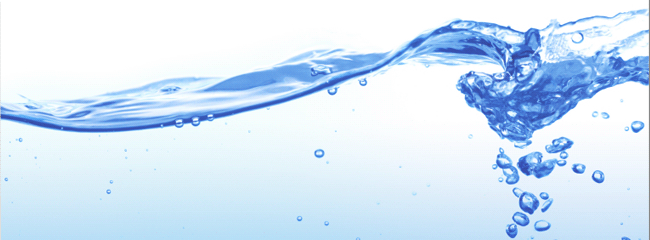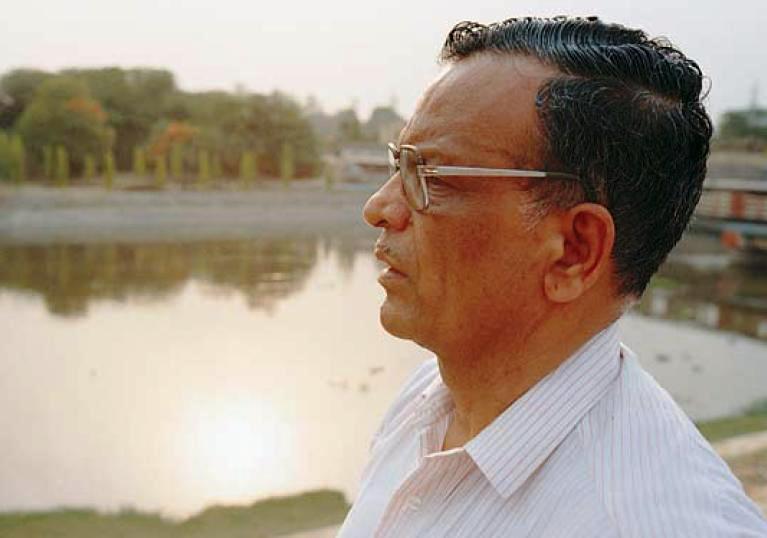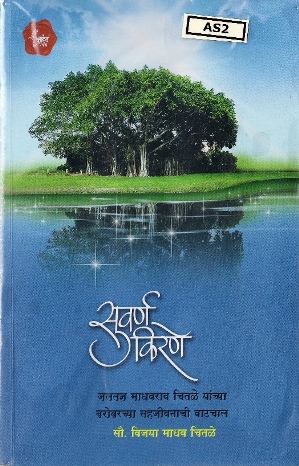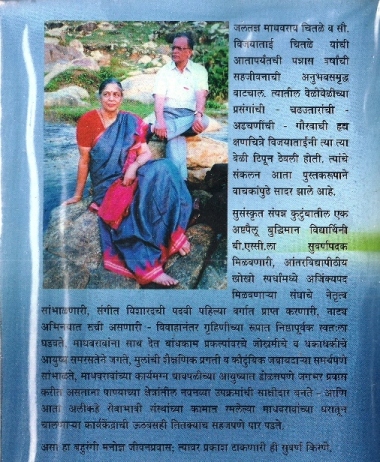

|
||||
|
|
 Dr. Madhavrao Chitale, born in
1934, graduated with distinction in Civil
Engineering in 1955 and joined the Maharashtra State
Engineering Service (Class I) in 1956, where he held
engineering posts at various levels associated with
planning, investigation and construction of river
valley projects and then worked as Secretary to the
Government of Maharashtra (1981-1983), before moving
over to the Government of India in 1984, as
Commissioner, River Basins. He was appointed as
Chairman, Central Water Commission (apex body of
India's water sector) and Ex-Officio Secretary to
the Government of India in 1985 and thereafter as
Secretary, Ministry of Water Resources, Government
of India from 1989. He retired from Government
service in August 1992.
Dr. Chitale was
Chairman of Indian National Committee on Large Dams
(1986-1987), Indian National Committee of ICID
(1986-1987), and Indian National Committee on
Hydrology (1985-1988), President, Indian Water
Resources Society (1989-1990), and a Vice President,
International Water Resources Association
(1989-1991). He is member of the United Nations
Environmental Program's Water Advisory Committee
(since 1989) and Vice President of the Indian
National Academy of Engineering (1992-1993). He was
honoured with the degree of Doctor of Science (Honoris
Causa) by the Jawahar Lal Nehru Technological
University, Hyderabad in 1989. Member of the United
Nations Environment Program's Water Advisory
Committee (1989-92). Member of the Scientific and
Programme Committee of the International Lake
Environment Foundation (ILEC) since May 1995. Member
of the Interim Foundation Committee for World Water
Council since April 1995 and then Member of the
Interim Board of Governors of WWC since March 1996
and of the Executive Committee of WWC since June
1996. Chairman, Maharashtra State (2nd) Irrigation
Commission since January 1996.
Dr. Chitale was
awarded Stockholm Water Prize in 1993 for his
contribution to the conservation of the worlds water
resources and public education programmes. As a result of Dr. Chitale's efforts, the recent years have been the
most dynamic for the water sector in India. His work
resulted in an introduction of sound water resources
policies, including water pollution control and
water quality management, throughout the nation.
Previously little attention was given to the subject
and most of the work was fragmented.
The nomination of Dr.
Chitale reflected the enormous impact of political
education and solid administrative and
organisational skills in the process of structuring
water conservation in developing countries. The
choice of Dr. Chitale proved that high standards of
water management are not only applicable in the
western industrialised world.
Dr. Chitale recognised
the need for public awareness of, and support for,
the value of water resources. He introduced a "Water
Resources Day," which takes place once a year
throughout the vast subcontinent to increase public
awareness of the problems associated with the
management and supply of water for domestic,
industrial and agricultural use.
This effort placed the
subject of water on the priority agenda not only of
India but also of the bordering countries in South
Asia. He received many honours and awards in recent
years for his achievements for the millions of
people in the region who benefit from his work. Dr. Chitale has had a
brilliant career in the water-oriented industry
since graduating with first class honours with
distinction in 1955.
In 1956 he joined the
Maharashtra State Engineering Service working in a
variety of water projects, including some of the
most challenging and complex tasks in design and
construction of dams, irrigation schemes, water
supply and power projects. Among his achievements
was the rapid restoration of Pune City water supply
after the collapse of the Panshet and Khadakwasla
dams and the construction of under-creek tunnels for
the water supply to Bombay.
His talents being
greatly recognised, the Indian government appointed
him Commission for River Basins and in 1985 Chairman
of the Central Water Commission. In 1989 he was
appointed Secretary of the Ministry of Water
Resources for the Government of India, the highest
rank in India which an engineer can occupy. His
appointment to this position was recognition of his
abilities and the contributions he had made.
During recent years he
initiated the establishment of a National Water
Board for the implementation of a National Water
Policy which he was instrumental in forming in 1987.
The proposal materialised in September 19990 and the
National Water Board is responsible for initiating
effective measures for the systematic development of
the water resources in India.
He reorganised the
Central Water Commission in 1991 and established an
Environmental Management Organisation also covering
environmental impact assessment studies and
environmental monitoring. He was instrumental in
establishing the Water Quality Monitoring and
Management of the Ganges.
On an international
basis, Dr. Chitale has made many presentations
throughout the world and his publications on water
resources have been studied eagerly by those
interested in the subject. He has been a member of
the United Nations Environment Programme's Water
Advisory Committee. In the early 90s Dr. Chitale
retired from service within the Government of India
and accepted the post of Secretary General for the
International Commission on Irrigation and Drainage
from January 1, 1993. This appointment was another
recognition of his international standing the field
of water resources.
1. Academic
qualifications and achievements –
Dr. Madhavrao Chitale, born in
1934, graduated with distinction in Civil
Engineering in 1955 and joined the Maharashtra State
Engineering Service (Class I) in 1956, where he held
engineering posts at various levels associated with
planning, investigation and construction of river
valley projects and then worked as Secretary to the
Government of Maharashtra (1981-1983), before moving
over to the Government of India in 1984, as
Commissioner, River Basins. He was appointed as
Chairman, Central Water Commission (apex body of
India's water sector) and Ex-Officio Secretary to
the Government of India in 1985 and thereafter as
Secretary, Ministry of Water Resources, Government
of India from 1989. He retired from Government
service in August 1992.
Dr. Chitale was
Chairman of Indian National Committee on Large Dams
(1986-1987), Indian National Committee of ICID
(1986-1987), and Indian National Committee on
Hydrology (1985-1988), President, Indian Water
Resources Society (1989-1990), and a Vice President,
International Water Resources Association
(1989-1991). He is member of the United Nations
Environmental Program's Water Advisory Committee
(since 1989) and Vice President of the Indian
National Academy of Engineering (1992-1993). He was
honoured with the degree of Doctor of Science (Honoris
Causa) by the Jawahar Lal Nehru Technological
University, Hyderabad in 1989. Member of the United
Nations Environment Program's Water Advisory
Committee (1989-92). Member of the Scientific and
Programme Committee of the International Lake
Environment Foundation (ILEC) since May 1995. Member
of the Interim Foundation Committee for World Water
Council since April 1995 and then Member of the
Interim Board of Governors of WWC since March 1996
and of the Executive Committee of WWC since June
1996. Chairman, Maharashtra State (2nd) Irrigation
Commission since January 1996.
Dr. Chitale was
awarded Stockholm Water Prize in 1993 for his
contribution to the conservation of the worlds water
resources and public education programmes. As a result of Dr. Chitale's efforts, the recent years have been the
most dynamic for the water sector in India. His work
resulted in an introduction of sound water resources
policies, including water pollution control and
water quality management, throughout the nation.
Previously little attention was given to the subject
and most of the work was fragmented.
The nomination of Dr.
Chitale reflected the enormous impact of political
education and solid administrative and
organisational skills in the process of structuring
water conservation in developing countries. The
choice of Dr. Chitale proved that high standards of
water management are not only applicable in the
western industrialised world.
Dr. Chitale recognised
the need for public awareness of, and support for,
the value of water resources. He introduced a "Water
Resources Day," which takes place once a year
throughout the vast subcontinent to increase public
awareness of the problems associated with the
management and supply of water for domestic,
industrial and agricultural use.
This effort placed the
subject of water on the priority agenda not only of
India but also of the bordering countries in South
Asia. He received many honours and awards in recent
years for his achievements for the millions of
people in the region who benefit from his work. Dr. Chitale has had a
brilliant career in the water-oriented industry
since graduating with first class honours with
distinction in 1955.
In 1956 he joined the
Maharashtra State Engineering Service working in a
variety of water projects, including some of the
most challenging and complex tasks in design and
construction of dams, irrigation schemes, water
supply and power projects. Among his achievements
was the rapid restoration of Pune City water supply
after the collapse of the Panshet and Khadakwasla
dams and the construction of under-creek tunnels for
the water supply to Bombay.
His talents being
greatly recognised, the Indian government appointed
him Commission for River Basins and in 1985 Chairman
of the Central Water Commission. In 1989 he was
appointed Secretary of the Ministry of Water
Resources for the Government of India, the highest
rank in India which an engineer can occupy. His
appointment to this position was recognition of his
abilities and the contributions he had made.
During recent years he
initiated the establishment of a National Water
Board for the implementation of a National Water
Policy which he was instrumental in forming in 1987.
The proposal materialised in September 19990 and the
National Water Board is responsible for initiating
effective measures for the systematic development of
the water resources in India.
He reorganised the
Central Water Commission in 1991 and established an
Environmental Management Organisation also covering
environmental impact assessment studies and
environmental monitoring. He was instrumental in
establishing the Water Quality Monitoring and
Management of the Ganges.
On an international
basis, Dr. Chitale has made many presentations
throughout the world and his publications on water
resources have been studied eagerly by those
interested in the subject. He has been a member of
the United Nations Environment Programme's Water
Advisory Committee. In the early 90s Dr. Chitale
retired from service within the Government of India
and accepted the post of Secretary General for the
International Commission on Irrigation and Drainage
from January 1, 1993. This appointment was another
recognition of his international standing the field
of water resources.
1. Academic
qualifications and achievements – • Ranked first in B.E.(Civil) examination from College of Engineering Pune, in 1955. • Ranked first in the Maharashtra Public Service Commission Competitive Examination in Engineering in 1956. 2. Notable contributions and achievements in the Maharashtra State – • Joined Irrigation Department of Gov. of Maharashtra as Assistant Engineer(I) in 1956 • Completed emergency water supply scheme for Pune city in 1961 after disaster of Panshet and Khadakwasla dams. • Novel approach of providing ‘Plastic-Concrete diaphragm’ for alluvial foundation of Major Mula Earth dam was initiated and completed. • Planned Bhatsa Multipurpose project for Mumbai Metropolitan Region (1966-69). • Completed under-creek Tunnels for water supply to Mumbai city. • His work in restoration of the Koyna concrete dam (1968 to 69) after the disastrous earthquake of 1967 was highly acclaimed by the Govt. of Maharashtra. • Finalised proposal of strengthening of Bhatsa masonry dam after severe Earthquake near it in 1983. • Worked as Secretary to Government of Maharashtra in Irrigation Department (1981 to 83) for the development of command areas of Irrigation Projects and for handling of the interstate water related matters. He was then deputed to Govt. of India. 3. Notable contributions and achievements in India – • Worked as Chairman, Central Water Commission and Ex. Officio Secretary to Government of India (1985 to 89). Was involved in the evolution of National Water Policy for India released in 1987 by the National Water Resources Council headed by the Prime Minister of India. The Dam Safety Committee under his Chairmanship developed and released the guidelines for Dam Safety Procedures in 1988. He introduced practice of celebrating Water Resources Day in the country from April 1986. As a sequel to it, United Nations started celebrating ‘World Water Day’ at the World level since 1993. He established the National Water Board and introduced the practice of holding an annual National Water Convention to discuss the emerging issues in the water sector on a public platform. • As Secretary, Ministry of Water Resources, Govt. of India (1989 to 1992) he also chaired the Executive Committee of the Narmada Control Authority, and the National Water Development Agency which dealt with the Inter Basin Water Transfer Projects. He was closely involved with the management of the national and interstate projects like Farrakka, Tungabhadra, Bansagar & Betwa and in the dialogues with Bangladesh, Bhutan, Nepal and Pakistan on shared water resources, and with working of the Brahamaputra Board. 4. Notable contributions and achievements at the World level – • As the first full time Secretary General, of the International Commission on Irrigation and Drainage (ICID) from 1993 to 1997, he guided and assisted the 64 active National Committees on irrigation and drainage in the member countries and the 22 work bodies of the Commission in their assigned tasks for the promotion of Irrigation and Drainage worldwide on scientific lines. • He has been active at the International level for over 15 years in important positions, such as a member of the United Nations Environment programmes’ Water Advisory Committee (1989 to 92), as Vice president of the International Water Resources Association (1989 to 91), as member of the Foundation Committee for World Water Council (WWC) (1995 to 96) and thereafter as a member of the Board of Governors of WWC, Member of the Executive Committee of WWC and also as Chairman, Regional Centres Committee of WWC (1997), as member of the Scientific and Programme Committee of the International Lake Environment Foundation (ILEC) (1995 to 2005). As Chairman of South Asia Technical Advisory Committee (SASTAC) he took lead in establishing River Water Partnerships of the Stakeholder Organizations in India and other South Asian Countries. He has been elected as a Lifetime Honorary Fellow of the International Water Institute at Oslo, Norway in 1999. 5. Area/Field/Sector/Domain of Work Done – • Integrated Water Resource Development and Management, Involvement of Beneficiaries, Increasing Awareness about Water-related Problems. 6. Number of Years Working in the Field - 66 Years. 7. Impact/ Outcome/ Contribution of the Work Done – • His efforts to ensure and achieve Integrated Water Resource Development and Management, initially at the Country level, and later at the World level, would help in providing Food and Water Security for the future generations and thus achieving ‘Sustainable Development’. 8. Details of Any Awards or Honours Received by the Nominee – • Award Name - Stockholm Water Prize • Year of Award - 1993 • Field - Water Management • Type of Award - International • Awarding Authority - Royal Swedish Academy of Sciences • It is described as the ‘Water’s Nobel Prize’, awarded at the hands of King of Sweden in 1993. • He was selected for one year course on ‘International and Public Relations’ in Princeton University USA, where he acquired ‘A’ grade in all subjects and was nominated as ‘Pervin Fellow’. • The Indian Society for Hydraulics conferred on him the ‘Lifetime Achievement Award’ in 2008 at their Hydro 2008 conference. • Was awarded Doctor of Science (Honoris Causa) by the Jawaharlal University Hyderabad in 1989, by the Agriculture and Science University Kanpur in 1995, and by the Tilak University Pune in 2006. 9. Any Other Relevant Information – • Under his Chairmanship, the high level 12 members interdisciplinary Maharashtra Water and Irrigation Commission presented in the year 1999, an extensive 2000-page Report in 5 volumes outlining a perspective plan of actions for 25 sub-basins in the major River Basins of the Maharashtra State. • He worked as Chairman of the Committee set up in 2016 to finalise ‘Ganga Action Plan’. • He started organising ‘Sinchan Parishad’ from 1992, to establish dialogue between ‘Water Providers’ and ‘Water Users’. Since then, they are being held regularly every year in different Districts of the Maharashtra State. Click Here for "The Story of the Stockholm Water Prize Laureates" Click Here for Marathi Article by Shri. Vidyanand Ranade on Dr. Madhavrao Chitale
|
|||
|
|
|
|||
| © 2006~13 Pravin Kolhe |
|
Page Last Updated on 10-09-2022 22:09:15 | ||

